 This episode was kind of going okay there for a while. Nothing great or memorable but at least carrying a feeling or relevance, which was a step up. There have been way too many dandelion fluff sidebar eps of Furuba lately, so that represents progress. But the last ten minutes this week were literally almost unwatchable – that’s how much Kagura ruins Fruits Basket for me. Of course if she were the only problem that would be at least workable, since she only appears every half-dozen weeks or so. But..
This episode was kind of going okay there for a while. Nothing great or memorable but at least carrying a feeling or relevance, which was a step up. There have been way too many dandelion fluff sidebar eps of Furuba lately, so that represents progress. But the last ten minutes this week were literally almost unwatchable – that’s how much Kagura ruins Fruits Basket for me. Of course if she were the only problem that would be at least workable, since she only appears every half-dozen weeks or so. But..
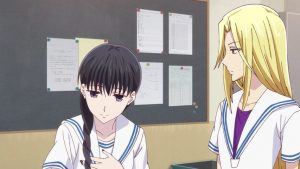 I’ve been thinking about the excellent first FB 2019 ED “Lucky Ending” quite a lot lately (prompted by my Fall Preview writeup of Chihayafuru as it happens, but that’s a story for later). Somehow its “Everything changes, everybody changes” seems especially apt for this series (and generally too, actually), and the way I relate to it. Fruits Basket changed, I changed, and nothing has been the same. Which change is the more important reason for that – or does it even matter? Choose your metaphor as you like – ships, planets in orbit – but when humans and stories cross paths its a unique moment in time. The circumstances will never be exactly the same again, so neither will our response to the story being told.
I’ve been thinking about the excellent first FB 2019 ED “Lucky Ending” quite a lot lately (prompted by my Fall Preview writeup of Chihayafuru as it happens, but that’s a story for later). Somehow its “Everything changes, everybody changes” seems especially apt for this series (and generally too, actually), and the way I relate to it. Fruits Basket changed, I changed, and nothing has been the same. Which change is the more important reason for that – or does it even matter? Choose your metaphor as you like – ships, planets in orbit – but when humans and stories cross paths its a unique moment in time. The circumstances will never be exactly the same again, so neither will our response to the story being told.
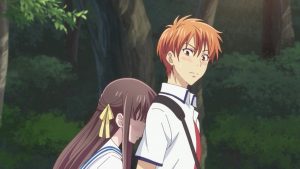 The fact is, Fruits Basket is not a slice of life series. I’m not sure the mangaka would agree – maybe, maybe not – but I’m confident Akitarou Daichi would. Furuba just can’t get away with fluffy asides the way something like Flying Witch or Tanaka-kun wa Itsumo Kedaruge can. Sure this series could probably do with a smaller cast, but even so it really needs to focus with laser precision on the characters and events that really matter. The start and ending of this week’s episode did that at least, but the part in the middle was like a slab of spoiled luncheon meat between two perfectly nice slices of bread.
The fact is, Fruits Basket is not a slice of life series. I’m not sure the mangaka would agree – maybe, maybe not – but I’m confident Akitarou Daichi would. Furuba just can’t get away with fluffy asides the way something like Flying Witch or Tanaka-kun wa Itsumo Kedaruge can. Sure this series could probably do with a smaller cast, but even so it really needs to focus with laser precision on the characters and events that really matter. The start and ending of this week’s episode did that at least, but the part in the middle was like a slab of spoiled luncheon meat between two perfectly nice slices of bread.
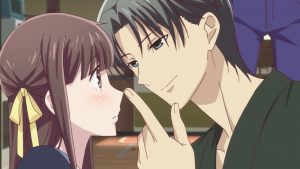 Of all the relationships in Fruits Basket, the one between Tohru and Kyou is as important as any. One could argue that Yuki is co-equally important with those two, but I’ve always (including the 2001) found him as interesting as a roll of wet paper towels and besides, I would argue that’s not the case. In any event, more interaction between Kyou and Tohru is good, and there’s been hardly any for weeks. The way they repeat their individual patterns incessantly (maybe I just notice it more now than I did) can be annoying, but at least there’s something emotionally meaningful going on there.
Of all the relationships in Fruits Basket, the one between Tohru and Kyou is as important as any. One could argue that Yuki is co-equally important with those two, but I’ve always (including the 2001) found him as interesting as a roll of wet paper towels and besides, I would argue that’s not the case. In any event, more interaction between Kyou and Tohru is good, and there’s been hardly any for weeks. The way they repeat their individual patterns incessantly (maybe I just notice it more now than I did) can be annoying, but at least there’s something emotionally meaningful going on there.
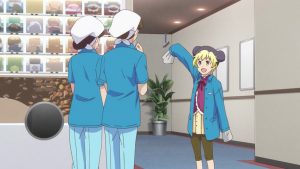 Indeed, we’re heading into another of those meaningful patches of story – ones that remain distinct in my memory even after all these years, and provide an acid test for whether Furuba and I still have a working relationship. For the most part it’s passed muster so far, and the introduction of Sohma Kazuma (Morikawa Toshiyuki) will provide another such barometer. In a series with too many characters for its own good, Kazuma absolutely matters. He’s critical, not least of all for Kyou’s development (which is as critical as it gets for Furuba). I haven’t always loved the casting choices in this version, but Morikawa seems like a potential home run to me. We’re headed into a very important couple of episodes, and they’ll tell a lot about this series’ ability to go the distance.
Indeed, we’re heading into another of those meaningful patches of story – ones that remain distinct in my memory even after all these years, and provide an acid test for whether Furuba and I still have a working relationship. For the most part it’s passed muster so far, and the introduction of Sohma Kazuma (Morikawa Toshiyuki) will provide another such barometer. In a series with too many characters for its own good, Kazuma absolutely matters. He’s critical, not least of all for Kyou’s development (which is as critical as it gets for Furuba). I haven’t always loved the casting choices in this version, but Morikawa seems like a potential home run to me. We’re headed into a very important couple of episodes, and they’ll tell a lot about this series’ ability to go the distance.


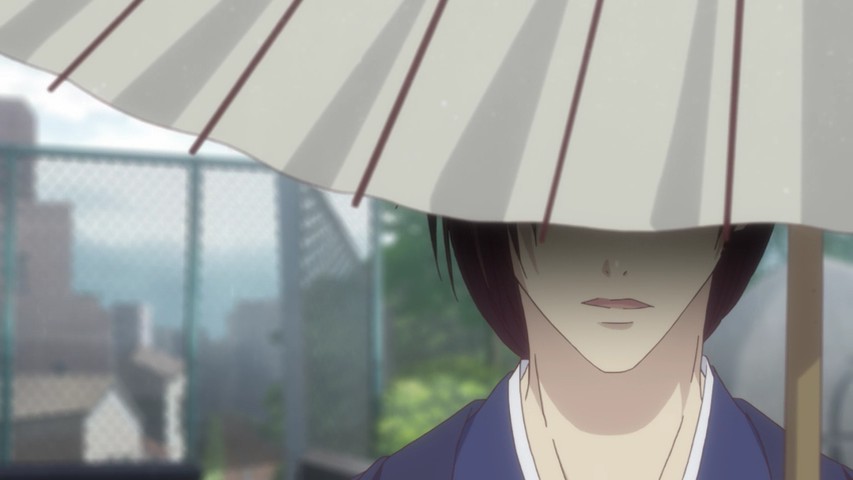
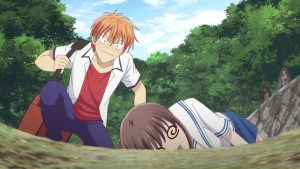
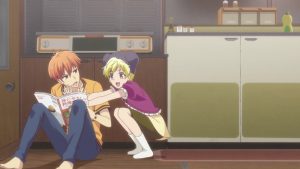
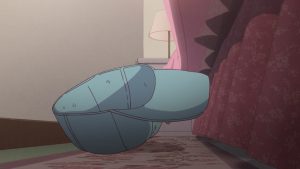
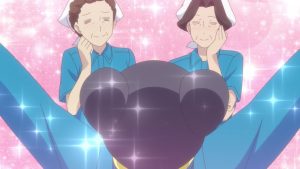
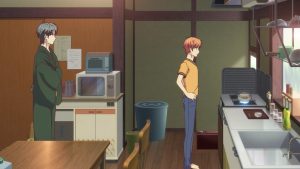
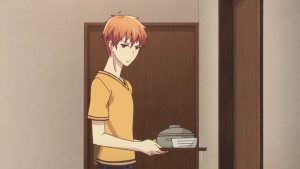
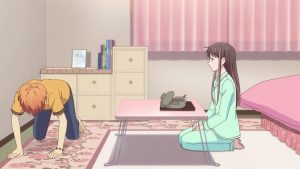
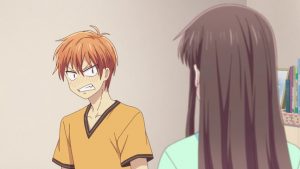
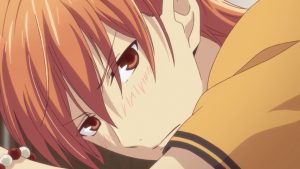
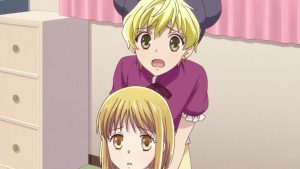
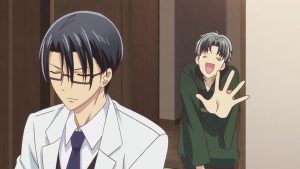
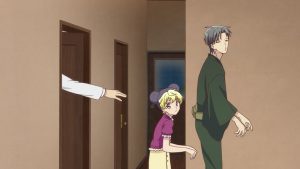
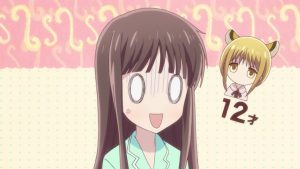
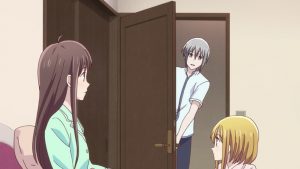
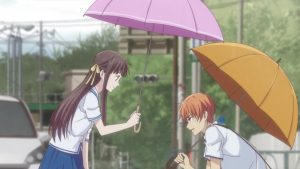
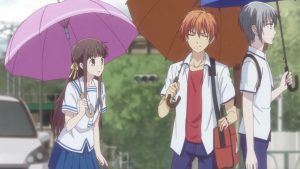
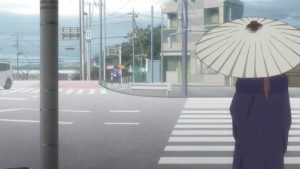
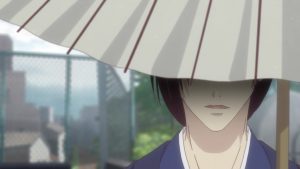
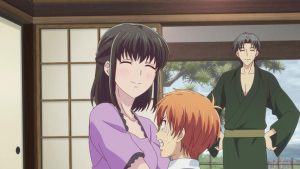
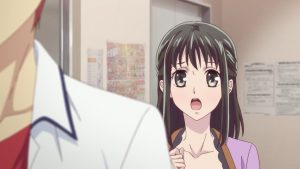
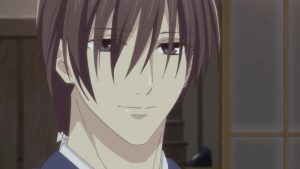
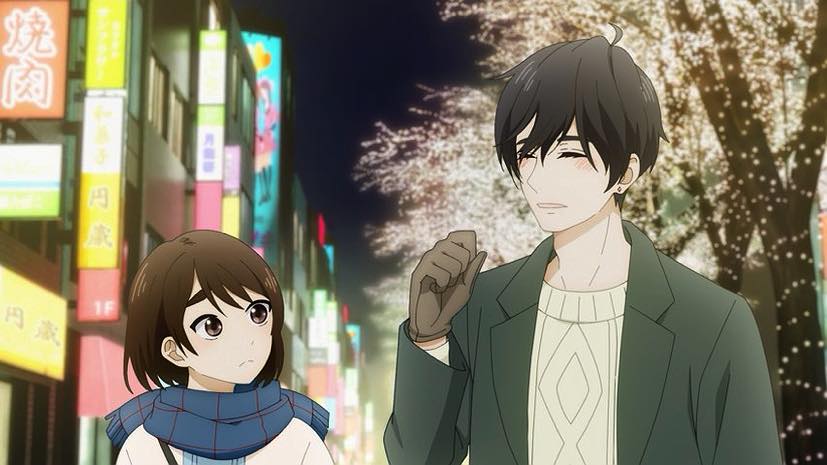
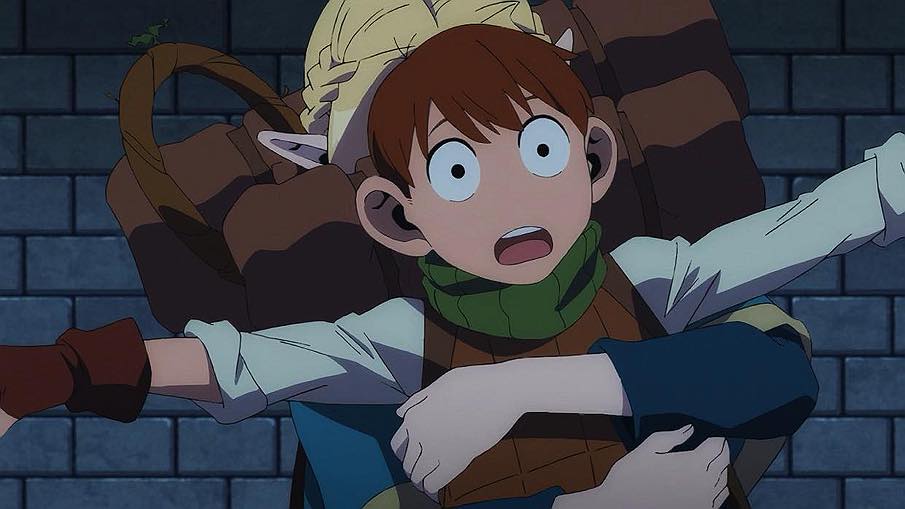
coriolisky
September 8, 2019 at 2:32 pmIt’s fine to prefer the 2001 Furuba. I agree that Daichi’s direction is far more accomplished. I also sorely miss Okazaki Ritsuko’s music and the earlier voice cast. However, I think your reading of the series is also limited to the 2001 version, which makes some of your analysis sound very poorly thought out. Uo and Hana’s stories are no less integral to the themes and heart of the story, whether you find them engaging or not. The same goes for Yuki’s arc, which is indisputably as central to the narrative as Tohru or Kyou’s.
Prefer what you like, but do keep in mind that the first six volumes — the point that the 2001 anime got up to — are only the foundation for the rest of the story, not the entirety of its character arcs and depth. The manga plays a much longer game.
Amy3422
October 12, 2019 at 1:48 pmThanķ you! I strongly agree, and Hana has always been a favourite character. Moving Hana and Uo’s stories forward lets us care more about their future development. It also saves space later on when the series will be saturated with melodrama about other characters. Moving some of the drama to Season 1 when things are still light struck me as a good balance.
The review points out the trade-off though, which is that we do go a long time without seeing Kyou and are potentially less prepared for his arc at the end of the season.